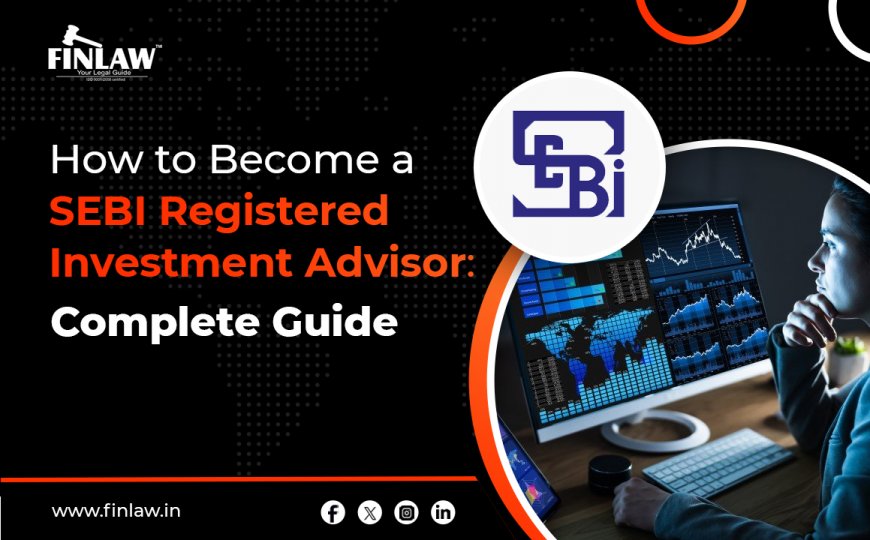How to Become a SEBI Registered Investment Advisor: Complete Guide
Learn how to become a SEBI registered investment advisor in India. Get step-by-step guidance on eligibility, registration process, compliance, and renewal.

Becoming a SEBI registered investment advisor (SEBI RIA) in India is a structured process governed by the Securities and Exchange Board of India (SEBI). This designation authorizes individuals and entities to provide investment advice to clients, ensuring adherence to regulatory standards and promoting investor protection.
Understanding SEBI and Its Role
SEBI is the regulatory authority overseeing the securities market in India. Its primary objectives include protecting investor interests, promoting market development, and regulating market participants. By mandating registration for investment advisors, SEBI aims to ensure that advisors possess the necessary qualifications, adhere to ethical standards, and maintain transparency in their dealings.
Why Register as a SEBI Investment Advisor?
-
Credibility and Trust: Registration with SEBI enhances the advisor’s credibility, making it easier to build trust with clients.
-
Legal Compliance: Providing investment advice without SEBI registration can lead to legal consequences.
-
Market Recognition: Registered advisors gain recognition from industry peers and clients, improving their professional standing.
-
Client Protection: SEBI ensures that RIAs follow ethical practices, protecting clients from fraud and malpractice.
Eligibility Criteria For SEBI Investment Advisor Registration
To qualify as a SEBI-registered investment advisor, applicants must meet specific educational, professional, and financial criteria:
1. Educational Qualifications
-
A professional qualification or postgraduate degree/diploma in fields such as finance, accountancy, business management, commerce, economics, capital markets, banking, insurance, or actuarial science.
-
Completion of certifications from the National Institute of Securities Markets (NISM), specifically:
-
NISM Series-XA: Investment Adviser (Level 1)
-
NISM Series-XB: Investment Adviser (Level 2)
2. Experience
-
A minimum of five years of experience in activities related to the financial services industry, such as financial planning, investment advisory services, or research.
3. Net Worth Requirements
-
For individuals: A minimum net worth of ₹5 lakh.
-
For non-individual entities (e.g., firms or companies): A minimum net worth of ₹50 lakh.
4. Additional Requirements
-
A clean CIBIL score, indicating good financial standing.
-
Submission of income tax returns for the last three years.
-
Adequate infrastructure to effectively discharge investment advisory services.
Step-by-Step Registration Process For SEBI Investment Advisor
The process to become a SEBI registered investment advisor involves several key steps:
1. Access the SEBI Intermediary Portal
-
Visit the SEBI Intermediary Portal and create an account by paying an initial registration fee of ₹2,000.
2. Complete the Application Form
-
Fill out Form A, providing details such as personal information, educational qualifications, professional experience, and business plans.
-
Upload necessary documents, including proof of identity, address, qualifications, experience certificates, net worth certificate, CIBIL score, and income tax returns.
3. Application Review
-
SEBI will review the submitted application and may request additional information or clarifications if required.
4. Payment of Registration Fee
-
Upon approval, pay the registration fee:
-
Individuals and firms: ₹3,000
-
Corporate bodies and LLPs: ₹15,000
5. Obtain Registration Certificate
-
After payment confirmation, SEBI will issue a registration certificate, authorizing the applicant to commence investment advisory services.
6. Register with Stock Exchanges
-
SEBI mandates registration with recognized stock exchanges.
-
For instance, registration with BSE involves a fee of ₹6,000 plus GST for individuals and ₹3,00,000 plus GST for non-individuals.
Post-Registration Compliance Requirements
Once registered, investment advisors must adhere to several compliance obligations:
1. Fiduciary Duty
-
Act in the best interests of clients, ensuring transparency and full disclosure of any conflicts of interest.
2. Client Agreement
-
Advisors must enter into a formal client agreement before providing advisory services. The agreement should cover the scope of services, fees, and dispute resolution mechanisms.
3. Fee Structure
-
SEBI has imposed a cap on the fees that investment advisors can charge:
-
Assets under Advice (AUA) Model: A maximum of 2.5% per annum of the AUA.
-
Fixed Fee Model: A maximum of ₹75,000 per client per annum.
4. Segregation of Services
-
Individuals registered as investment advisors are prohibited from offering distribution or execution services to their clients.
5. Grievance Redressal Mechanism
-
Establish a mechanism to address client complaints and grievances effectively.
6. Continuous Professional Development
-
Engage in ongoing education to stay updated with industry developments and maintain the validity of certifications.
7. Record-Keeping
-
Maintain detailed records of all client interactions, advice provided, and transactions undertaken to ensure accountability and facilitate regulatory audits.
Renewal of SEBI Investment Advisor Registration
SEBI investment advisor registration is valid for a period of 5 years. Advisors must apply for renewal at least 3 months before the expiry of their registration. The renewal process involves submitting a fresh application along with the required documents and fees.
Common Challenges Faced by Aspiring Investment Advisors
-
Meeting Net Worth Requirements: Many individuals find it challenging to meet the minimum net worth criteria, especially during the initial stages of their careers.
-
Navigating Regulatory Requirements: The registration process involves extensive documentation and compliance with regulatory norms, which can be overwhelming.
-
Continuous Compliance: Post-registration, advisors must adhere to various ongoing compliance requirements, including audits and reporting.
-
Client Acquisition: Building a client base and gaining their trust requires significant effort and a strong value proposition.
Tips for Aspiring SEBI Investment Advisors
-
Gain Relevant Experience: Work in financial advisory roles to build the necessary experience and expertise.
-
Focus on Professional Development: Pursue relevant certifications and courses to enhance your knowledge and skills.
-
Leverage Technology: Use financial advisory software to streamline operations and improve service delivery.
-
Build a Strong Online Presence: Establish a professional website and engage in content marketing to attract potential clients.
-
Network with Industry Professionals: Attend industry events and join professional associations to expand your network and stay updated on industry trends.
Frequently Asked Questions (FAQs)
Q1: What is the role of a SEBI registered investment advisor?
A SEBI-registered investment advisor provides professional financial advice to clients while adhering to regulatory and ethical standards set by SEBI. They help clients make informed investment decisions.
Q2: Can an individual with no financial background apply for SEBI registration?
No, SEBI mandates specific educational qualifications and relevant experience in financial services. Applicants must also complete the required NISM certifications.
Q3: How long does it take to get SEBI registration?
The process can take anywhere from 3 to 6 months, depending on the completeness of the application and SEBI’s review timeline.
Q4: Is there any annual fee after getting SEBI registration?
No, there is no annual fee. However, advisors must comply with ongoing regulations, including audits and periodic reporting.
Q5: What happens if an advisor fails to renew the registration on time?
Failure to renew the registration before its expiry can lead to suspension of advisory services and legal penalties.
Q6: Can a SEBI-registered investment advisor also sell financial products?
No, SEBI mandates segregation of advisory and distribution services. Advisors cannot sell financial products to their advisory clients.
Conclusion
Embarking on the journey to become a SEBI registered investment advisor in India requires a commitment to meeting stringent educational, professional, and ethical standards. This rigorous process ensures that advisors are well-equipped to provide sound investment advice, fostering trust and confidence among investors. By adhering to SEBI's regulations and maintaining a client-centric approach, investment advisors can contribute significantly to the integrity and growth of India's financial markets.
For those interested in financial advisory services, becoming a SEBI-registered investment advisor is a rewarding career choice, offering opportunities to positively impact clients' financial well-being while adhering to the highest standards of professionalism and integrity.
What's Your Reaction?



















